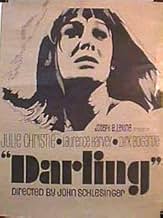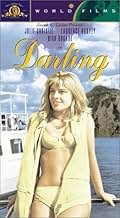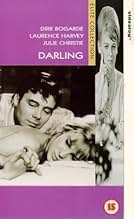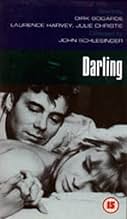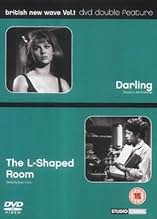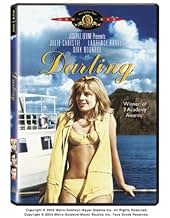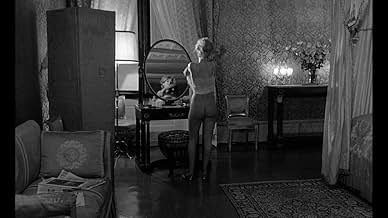AVALIAÇÃO DA IMDb
7,0/10
8,4 mil
SUA AVALIAÇÃO
Adicionar um enredo no seu idiomaBeautiful but amoral model Diana Scott sleeps her way to the top of the London fashion scene at the height of the Swinging Sixties.Beautiful but amoral model Diana Scott sleeps her way to the top of the London fashion scene at the height of the Swinging Sixties.Beautiful but amoral model Diana Scott sleeps her way to the top of the London fashion scene at the height of the Swinging Sixties.
- Direção
- Roteiristas
- Artistas
- Ganhou 3 Oscars
- 17 vitórias e 8 indicações no total
José Luis de Vilallonga
- Prince Cesare della Romita
- (as Jose Luis De Vilallonga)
T.R. Bowen
- Tony Bridges
- (as Trevor Bowen)
Avaliações em destaque
"Darling", as it happens with most genuine works of art, it grows, it develops over the years and acquires a sort of clarity that, with the benefit of hindsight I will dare to call it, prophetic, as a social observation of its time. But what matters most is the film as a film. Brilliantly thought, written, directed, photographed and, of course, acted. Julie Christie became a symbol. She, clearly a very intelligent woman, surfed the waves of fame with an apparent detachment that I'm sure it's a sure sign of maturity and of a great respect for her profession and herself. If you think I love Julie Christie, you're right. But my love for her has to do with "Darling" and the age I was when I first saw it. The 60's were already in the past then but I saw them in the future, an immediate future.I can't imagine anyone, from any age, who loves film could be indifferent to this tale of isolation in a world moving fast towards an acceptable cult for celebrity. Not to be missed.
What a delight. Possibly the best of the British New Wave and one of the finest British films of all time. The story follows Julie Christie's rise up the social ladder by a succession of affairs and social posturing she's infuriating, but you can't resent her behaviour, she is so natural and full of joie de vivre impossible to keep in a cage. She first appears walking along the street swinging her handbag the same entrance as she made in "Billy Liar" and surely an indication that we are dealing with essentially the same character. Bogarde, a television journalist, is the first man she takes up with, and is as serious as she is reckless, yet somehow they are well-suited and their relationship, with some painfully familiar ups and downs, is touching.
The emotional core of the film is Bogarde and Christie's visit to an old writer. This, her first step up the social ladder, gives her the thrill of being somewhere, doing something. It is also a gently melancholy and thoughtful scene. Humour and emotion come in equal measure throughout, and every exchange crackles with meaning:
Christie: "You used me!" Bogarde: "You used me. It's a moot point."
Christie really earned her Oscar for this. Her performance is full of humour and irony, but she's mainly being herself and she has a genuine sensitivity and humanity that lifts you and carries you along. Only some slightly flippant scenes with her photographer friend (especially the shoplifting scene which was too much like "Breakfast at Tiffanys") were a little out of alignment. But Schlesinger does special things throughout. Every scene is like a little self-contained story, so sharply done you can almost hear a snap at the beginning and end as it falls into place.
This is a big film, almost as big as "La Dolce Vita" which it sometimes echoes - better, perhaps, on account of the razor sharp script by Frederic Raphael which is so accomplished, smooth, intelligent, witty and ironic that it has an almost poetic quality while still being thoroughly down-to-earth. The ending is unexpectedly downbeat, and doesn't feel like the real end, just a line they had to draw somewhere - which is perhaps what the film really was all about: the lines that we have to draw at certain points in our lives that rule some things in, other things out, that enable us to go on, for better or worse. Really splendid stuff.
The emotional core of the film is Bogarde and Christie's visit to an old writer. This, her first step up the social ladder, gives her the thrill of being somewhere, doing something. It is also a gently melancholy and thoughtful scene. Humour and emotion come in equal measure throughout, and every exchange crackles with meaning:
Christie: "You used me!" Bogarde: "You used me. It's a moot point."
Christie really earned her Oscar for this. Her performance is full of humour and irony, but she's mainly being herself and she has a genuine sensitivity and humanity that lifts you and carries you along. Only some slightly flippant scenes with her photographer friend (especially the shoplifting scene which was too much like "Breakfast at Tiffanys") were a little out of alignment. But Schlesinger does special things throughout. Every scene is like a little self-contained story, so sharply done you can almost hear a snap at the beginning and end as it falls into place.
This is a big film, almost as big as "La Dolce Vita" which it sometimes echoes - better, perhaps, on account of the razor sharp script by Frederic Raphael which is so accomplished, smooth, intelligent, witty and ironic that it has an almost poetic quality while still being thoroughly down-to-earth. The ending is unexpectedly downbeat, and doesn't feel like the real end, just a line they had to draw somewhere - which is perhaps what the film really was all about: the lines that we have to draw at certain points in our lives that rule some things in, other things out, that enable us to go on, for better or worse. Really splendid stuff.
I had not seen this film since 1965 when I was a college student but remember how electrifying it was to see a young, charismatic Julie Christie at the beginning of her peak years. She's given some great scenes to show off her multi-faceted personality and she throws herself into the amoral model, Diana, who sleeps her way to the top. I can't imagine any other actress who could have done this without being repulsed by her naked greed and amorality. Christie had an inner radiance that makes her likable throughout this ground-setting import from London. England had become a hot movie center during this era, giving us such phenomenal movies like "Georgy Girl," "women in love," "Isadora," and many more. We can see this movie as a time machine which captures the raw energy of that era as our sexuality began to expand into new realms from the staid values of the past. This is a terrific movie to watch from time to time and watch an early phenomenon begin her golden career.
Julie Christie deserved her Oscar. So did the scriptwriters--"Should Popes be ancestors?" And no on-screen sex when the film is considerably about sex!
When the lead character becomes a princess one is reminded of Princess Diana's own life. Both are Dianas. A very unusual, complex work from Schlesinger.
I did not appreciate the film when I saw it in the Sixties; now I do. What a great year for Christie--this and "Dr Zhivago."
The social commentary is hard hitting--young black boys serving snacks and drinks to perverted white adults, the facetious interest of the idle rich in feeding the hungry around the world as the rich gobble food they do not need to eat, of rich princes busy renovating their palace's washing closets.
When the lead character becomes a princess one is reminded of Princess Diana's own life. Both are Dianas. A very unusual, complex work from Schlesinger.
I did not appreciate the film when I saw it in the Sixties; now I do. What a great year for Christie--this and "Dr Zhivago."
The social commentary is hard hitting--young black boys serving snacks and drinks to perverted white adults, the facetious interest of the idle rich in feeding the hungry around the world as the rich gobble food they do not need to eat, of rich princes busy renovating their palace's washing closets.
To see this 60's landmark film is quite something. In many ways could be considered a period piece and at the same time it could have been conceived yesterday. Julie Christie's performance is the insurance "Darling" has to ensure its powerful sailing through the years into the forever ever. She is extraordinary! Schlesinger lets himself be guided by something other than his British restrain and fear of sentimentality here. He is tough and poetic telling us the story of Diana Scott (could had been Lady Diana Spencer to a T) with understanding and compassion but without trying to make her a sympathetic character. Julie Christie takes care of that in what, time will tell, in fact is already telling us, one of the best performances on film, ever.
Você sabia?
- CuriosidadesThe "vox pop" TV interviews conducted by Dirk Bogarde's character with people in the street were all done with genuine members of the public, not actors, and were not scripted.
- Erros de gravaçãoWhen Diana and Robert quarrel and he leaves the apartment they share together, a microphone is visible on the left of the scene.
- Citações
Diana Scott: Taxi!
Robert Gold: We're not taking a taxi.
Diana Scott: Why not?
Robert Gold: I don't take whores in taxis.
Diana Scott: What do mean?
Robert Gold: That's what you are isn't it? A little whore! Isn't it?
- Versões alternativasThe original UK cinema version was cut by the the BBFC to remove shots of a man wearing a woman's corset and to heavily shorten a scene at a party in Paris where guests watch a couple making love on a hotel bed (the scene was edited to end the scene before the male partner appears). Video versions featured the same print though the cuts were later found and restored for the 2007 Optimum DVD release.
- ConexõesFeatured in Film Review: Julie Christie & John Schlesinger (1967)
Principais escolhas
Faça login para avaliar e ver a lista de recomendações personalizadas
- How long is Darling?Fornecido pela Alexa
Detalhes
Bilheteria
- Orçamento
- £ 400.000 (estimativa)
- Faturamento bruto mundial
- US$ 25.444
- Tempo de duração2 horas 8 minutos
- Cor
Contribua para esta página
Sugerir uma alteração ou adicionar conteúdo ausente



